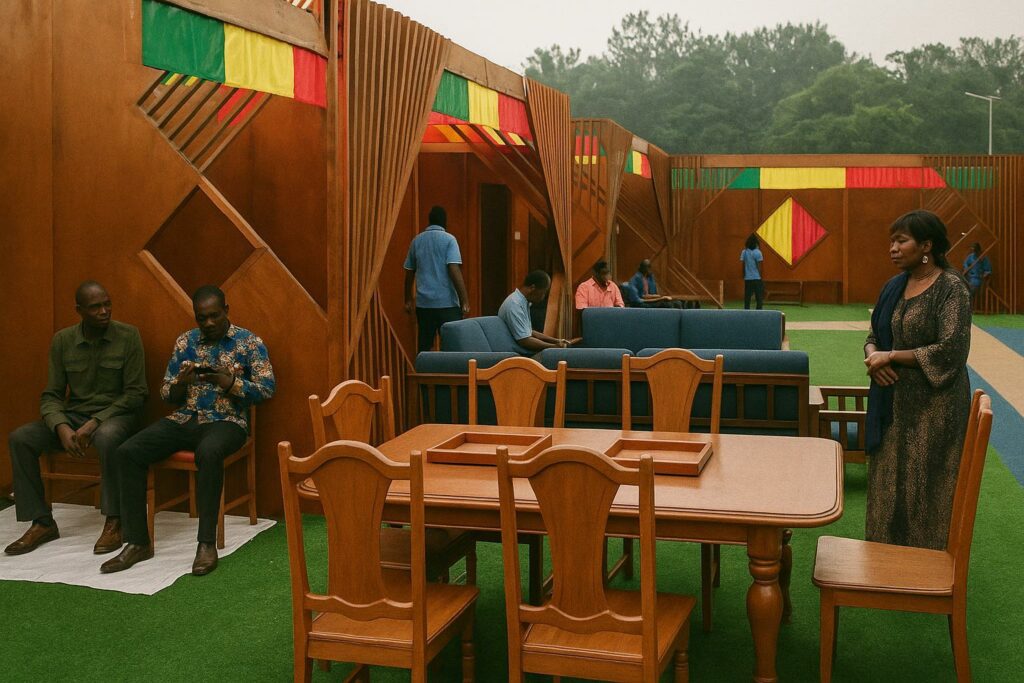Government-backed fair spotlights artisanal excellence
The vast courtyard of the Palais des Congrès has taken on the air of a bustling craft village as more than one hundred stalls display hand-carved beds, polished mahogany armchairs and woven raphia handbags. The fourth edition of the Salon des Métiers du Bois, running from 11 to 25 August, was opened by the Minister of Industrial Development and the Promotion of the Private Sector, who described the exhibition as “a living laboratory of Congolese know-how”. Official figures indicate that some 70 percent of the exhibitors come from the nation’s interior departments, suggesting a deliberate effort to include rural micro-enterprises in the capital’s economic circuit. Diplomatic observers in Brazzaville note that the initiative fits neatly into President Denis Sassou Nguesso’s 2022-2026 National Development Plan, which assigns artisanal value chains a central role in job creation (Government of Congo 2022).
From raphia canvases to smart-phone stands: the art of adaptation
Standing beside a set of intricately chiselled baby cots, cabinet-maker Raoul Mayembé explains that the fair “opens a door to clientele that usually turns to imported furniture”. A few aisles away, designer Jaurès Bantsimba showcases cedar ‘socle-phones’, sculpted chargers adapted to the growing demand for remote work accessories. On another corner, Pascal Ngalibo displays raphia tapestries depicting village dances, proof that non-timber forest products can meet urban tastes. Such diversification within the product range mirrors a continental trend towards niche artisanal luxury goods that fetch higher margins on regional e-commerce platforms (UNECA 2023).
A strategic pillar in economic diversification
Timber was the republic’s main export until the oil boom of the late 1970s; today crude still accounts for over four-fifths of GDP. Yet, according to the African Development Bank, forestry and first-stage wood processing continue to employ nearly 40,000 people and generate around 5.6 percent of national output (AfDB 2023). Economist Alphonse Ndongo argues that “a reinvigorated wood sector can insure the economy against hydrocarbon volatility”. His assessment is supported by customs data showing that processed wood exports grew by 18 percent in 2022, while log shipments remained stable (ITTO 2023). Recent fiscal incentives—most notably a reduced corporate tax rate for firms that add local value—aim to encourage a shift from raw log exports toward finished furniture destined for the Central African Economic and Monetary Community.
Sustainability commitments and international resonance
Mindful of environmental scrutiny, the Congolese authorities paired the fair with a workshop on sustainable forest management, co-hosted by the Central African Forests Commission. The Ministry of the Environment reiterated its pledge to bring 100 percent of industrial concessions under third-party certification by 2025, a target broadly welcomed by EU trade counsellors present at the fair. The Food and Agriculture Organization lists Congo among the African states that have recorded a net reduction in deforestation rates over the past decade, thanks in part to selective logging norms (FAO 2022). Showcasing eco-labelled furniture in Brazzaville therefore carries reputational benefits that extend beyond the sub-region.
Financial hurdles and avenues for partnership
Access to affordable credit remains a constraint for many artisans whose collateral seldom meets commercial bank requirements. During a panel discussion, the Congolese Agency for the Promotion of SMEs announced a CFA 5 billion guarantee facility aimed at workshop modernisation. Representatives of the World Bank Group, which recently approved a 100 million-dollar line of credit for agribusiness and wood transformation, signalled readiness to co-finance training centres in Ouesso and Dolisie (World Bank 2023). Foreign missions in Brazzaville privately concede that the sector offers a pragmatic entry point for south-south investment, particularly from Moroccan and Turkish furniture makers looking to shorten supply chains.
Prospects for a resilient post-oil narrative
Diplomats observing the fair detect a subtle recalibration of Congo’s development narrative: far from abandoning hydrocarbons, the government is visibly broadening its portfolio by revitalising an industry that predates the oil era. If the momentum generated at the Salon des Métiers du Bois translates into increased certification, deeper regional integration and expanded artisan finance, the timber value chain could emerge as a veritable hedge against external shocks. For countless exhibitors who have spent two weeks under the scorching Brazzaville sun greeting visitors from embassies, multilateral banks and the local elite, the hope is that their craft will no longer be seen as a cultural afterthought but as an indispensable strand of national resilience.

